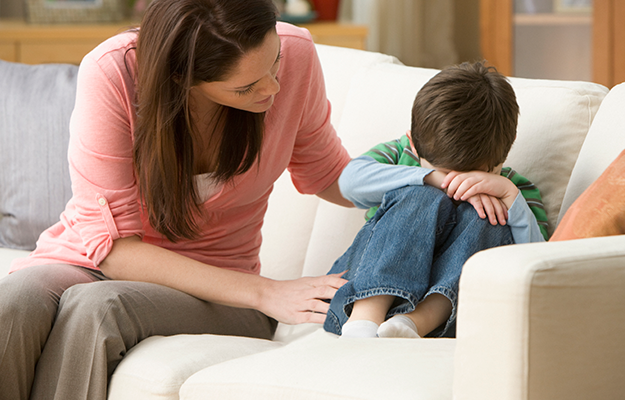
A lot of children get the jitters on the first day back at school, but for some that butterflies-in-the-stomach feeling is constant.
Sadly, many children have to deal with these paralysing feelings on a daily basis.
To lift the lid on a problem that’s often bottled up, we spoke to psychologists Gemma Cribb and Nicole Hyatt on how to identify anxiety and ways to keep it in check.
When parents separate
John* (14) felt like his anxiety levels went into overdrive when his parents decided to separate. “I became nervous all the time and the worrying meant I couldn’t sleep, I found it hard to concentrate and the smallest things would tip me over the edge,” he explains. “I broke down frequently and lashed out at those closest to me. I lost myself. It felt like I was living on the edge of a cliff, constantly afraid of falling.”
A physical reaction
Whenever Natasha* (16) got stressed at school, she noticed a sharp pain down the left side of her chest. “I tried to just ignore it, but one day it got worse,” she says. Natasha was scared – her heart was pounding and her breathing was shallow. “I thought I was having a heart attack and remember actually checking my pulse. I just couldn’t calm myself down.”
According to Gemma, Natasha’s bodily reaction is known as the “fight or flight” response. “Anxiety is the body’s way of responding to danger,” she says. “When the brain interprets something as dangerous, adrenalin is released and our body changes so that we can better fight that danger or run away. These changes can include a rapid heartbeat and breathing, sweating, dizziness, muscle tension, shaking, nausea, numbness or tingling, cold and hot flushes or a lump in the throat.”
What triggers anxiety?
Teenagers are often subjected to pressures that can bring on (or enhance) anxiety. “Common causes include worrying about appearance, social acceptance, dating, academic performance, family issues or the future,” Gemma says.
Nicole also points out recent research which suggests if a mom experienced anxiety while pregnant, it can be passed down to the child. “Cortisol, a hormone that is produced during pregnancy, can actually go through the placenta to the baby, potentially making the child more at risk of developing an anxiety condition.”
Types of anxiety
There are lots of types of anxiety disorders. Here’s a look at the most common ones.
Generalised anxiety disorder
Worrying excessively about everyday things such as school or friends over an extended period of time.
Social anxiety
An intense fear of being criticised or embarrassed in social situations. “Eating in public or making small talk can be daunting [for some people] because they’re worried what others think of them,” Nicole says.
Phobia
Having an overwhelming fear of a specific object or situation, such as animals, heights or small spaces. The fear is often much larger in proportion to the actual danger posed.
Obsessive compulsive disorder (OCD)
People with OCD experience ongoing anxious thoughts, which often result in repetitive behaviours. “A person may have an obsession with dirty hands and to alleviate the anxiety, they repeatedly wash them,” Nicole explains.
Post-traumatic stress disorder (PTSD)
When a person experiences extreme anxiety and often has distressing flashbacks after going through something traumatic.
Panic disorder
When a panic attack leads to fear of another attack, resulting in a vicious cycle of anxiety.
General symptoms to watch out for in your child:
- Worry and feelings of dread – constantly feeling something bad is going to happen
- Breathing difficulties, such as shortness of breath
- Feeling light-headed and/or nauseous
- Trembling or shaking
- Chest pains or a tight feeling in the chest area
- Insomnia and tiredness
- Spontaneous sweating
- Racing heart
Is my child anxious or just stressed?
It’s important not to confuse an anxiety disorder with just being stressed out. “Anxious feelings are a natural reaction to a high-pressure situation, such as having lots of assignments or speaking in front of people,” Nicole says.
So if your child is battling butterflies during exams but are back to their cool-as-a-cucumber self when school holidays hit, chances are they’re just stressed out. “But for some people, these anxious feelings happen for no real reason and continue when the stressful situation has passed,” she adds. If this sounds familiar, seek help.
Share these 6 calming tips with your child:
1. Breathe
Often people with anxiety disorders aren’t breathing properly. Teach yourself to take some deep breaths in and out so you’re expelling the same amount of carbon dioxide as oxygen.
2. Work up a sweat
Regular exercise will help release all that tension. Try dancing, swimming or a run around your local park with a friend.
3. Get some shut-eye
Lack of sleep can mean you find yourself getting wound up by the little things.
4. Treat yourself
Make sure you prioritise fun activities as well as the more stressful ones. Hang out with friends, treat yourself to a nice bath or go shopping.
5. Bend and stretch
Meditation, yoga and Pilates are great ways to relax the body – and mind.
6. Put pen to paper
Dr Nicole suggests writing down the things that worry you, then focusing on each point. Ask yourself, “What’s the likelihood of that actually happening?” You might find you’ve been seeing things as more catastrophic than they really are.
How to help your child
If you notice your child becoming more uptight about things she wouldn’t normally think twice about, Nicole suggests asking her about her fears. “Encourage her to think objectively. Say something like, ‘What are the chances of that occurring?’”
Gemma agrees listening is the best way to show support for your child. “Often just hanging out shows you care about her and understand, and can help take her mind off her worries. Take her to see a GP if the symptoms continue.”
If the situation becomes overwhelming, call Childline on 0800 55 555.




 Publications
Publications
 Partners
Partners
















